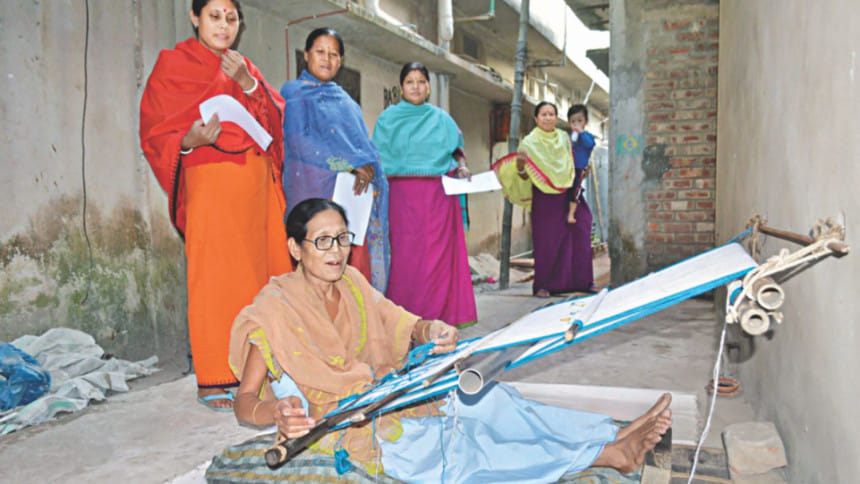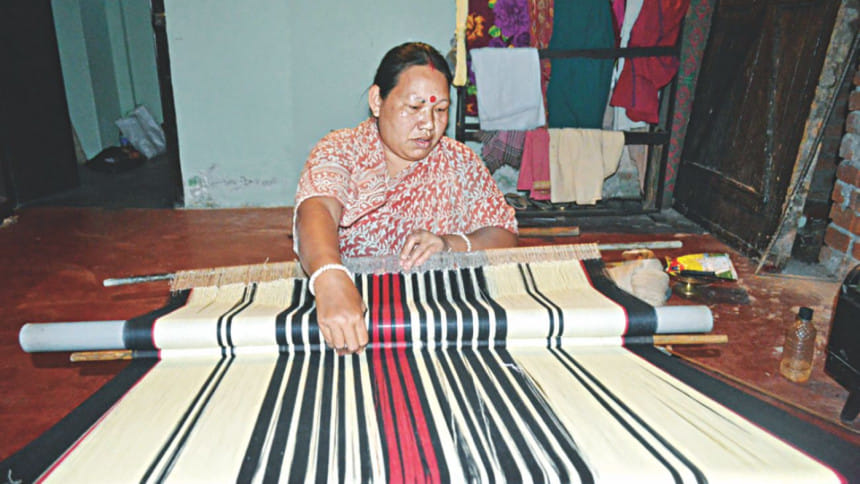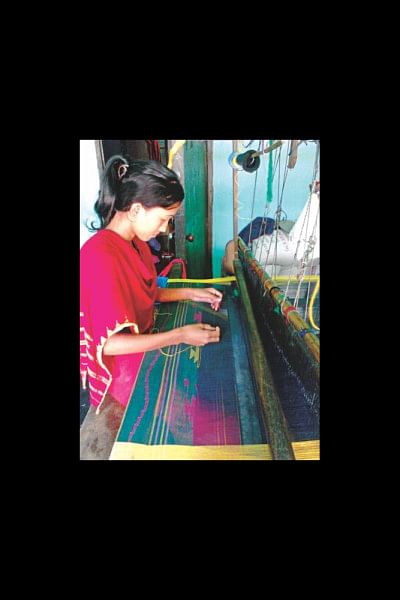Where weaving is part of heritage

Weaving is an integral part of the traditional Manipuri life.
For their elegant, exquisite and colourful designs and textures, the handloom products are not only coveted by all, they also play a vital role in their economy.
The demand for the products -- saris, shawls, bed-covers, bed-sheets, women's three-piece clothes, scarves and bags -- increases ahead of Eid.
During a recent visit to Lamabazar and Mashimpur in Sylhet city, and Kamalganj and Sreemangal upazilas in Moulvibazar, women were seen busy weaving garments and handloom items to meet the demand.

“Most of us are working round the clock,” said Leihaw Debi, a resident of Ambarkhana area in Sylhet city. The 50-year-old was weaving a sari. Its vivid colours shone even brighter in the morning sun.
Langlen Debi, 38, was working next to her. “The clothes are in high demand among young women,” she said.
Most women work from home. Many also choose to work together. Though the women were busy, they were chatting and laughing in between work.
The elderly were advising the young on how to weave properly and handle the intricacy of designs, while the younger ones were proudly showing off the new designs they came up with.
There was a sense of joy and excitement in the air.
It is not just about finishing orders ahead of Eid, weaving, to the Manipuri women, is more about spending time together and sharing a bond that goes back generations, said Leihaw Debi. “To us, weaving is about upholding the tradition,” she added.
Meanwhile, Mollika Debi just finished making a sari. It was a stunning blend of blue, grey and green. While showing it to this correspondent, she said smilingly, “Many newly-married women love to wear these.”

The women said after finishing the products, wholesalers from Lamabazar, Zindabazar, Tilaghar, Chowhatta, Ambarkhana and Bondorbazar areas collect those for distribution.
Traders from all over Sylhet throng the places to buy the products for selling at their stores. Many of them said the products, especially saris, are also in high demand outside the country.
A sari costs between Tk 4,000 and Tk 6,500; an orna (long scarf) costs Tk 850 to Tk 1,800; a gamchha (a long, thin piece of cotton clothing with a plaid pattern) costs Tk 850 to Tk 1,700; a shawl costs Tk 1,100 to Tk 2,000; a muffler Tk 400 to Tk 600, and a bag Tk 650 to Tk 1,000, said traders.
To help Manipuri women, Ethnic Community Development Organisation (ECDO) has been providing them with training on how to weave and get orders for their products.
Shilpi Singha, 35, a weaver in Sylhet city, said, “At first, I could not produce the multi-dimensional designs. After receiving training and support from ECDO, I now know how to create the designs, which buyers find attractive.”
Lakshmikanta Singh, executive director of ECDO, said ECDO helped the Manipuri weavers increase their handlooming skills and capacity by providing various trainings and technical support. “We also provided funds with support from Oxfam,” he said.
“We have also set up a production and display centre for marketing the products, MOIRANG, in 2014,” he added.
He, however, said, “The weavers got large orders from traders in Dhaka, Chittagong and Sylhet this year. The products are hand-made and it takes time to finish those. We need more support; otherwise it will get difficult to meet the increasing demand.”
Faruq Mahmud Chowdhury, president of Shushashoner Jonno Nagorik (Shujan), Sylhet chapter, said, “The government should extend support to promote this traditional sector.”
Contacted, Dr Nazmanara Khanom, divisional commissioner of Sylhet, said, “We have already taken some initiatives such as promoting tourism in the area to help the community. We have also undertaken a project to support the weavers.”
She suddenly smiled and added, “Even I prefer Manipuri saris. The one I'm wearing right now is a traditional handloom sari. I went to Kamalganj last week and bought it.”

 For all latest news, follow The Daily Star's Google News channel.
For all latest news, follow The Daily Star's Google News channel. 



Comments